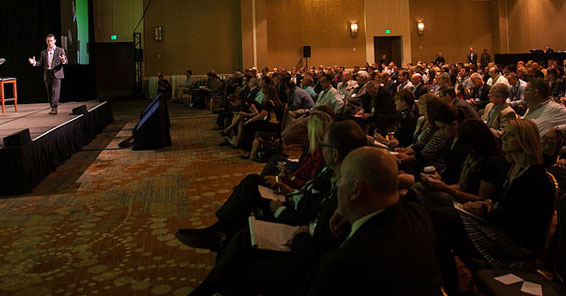Did the 2013 Election Really Matter?: Congress Unlikely To Act To Help The Economy
There's always more hype and more promises during a presidential election season. With all the rhetoric, expectations rise. The reality is likely to be quite different. I hope you liked 2012. In a nutshell, not much will change in 2013, as only two significant factors could alter this forecast.
One is unpredictable and largely out of the control of any of us: global conditions. The other is within our country's control: our own Congress. Unfortunately, even if the politicians in Washington somehow are overwhelmed by a strong dose of common sense (I hold out very little hope for this), the influence they can have in the next 12 months is rather limited. I'll look at the most important reasons why.
- Public debt is more than 100% of GDP. Not only the federal government, but also some of the most populous states have no ability to spend their way back to economic health. Household debt has started to come down from all-time highs, but it is only at 2006 levels and still well above historical norms. We simply took about 10 years of normal consumer and government spending and compressed it into 7 years. Earning our way back to normalized spending levels is still a few years away.
- Global weaknesses are outside our control but weigh heavily on the recovery. We can't expect much from Europe anytime soon. BRIC countries are unpredictable, led by China's apparent slowdown.
- Demographics are working against a normal U.S. economic recovery. For Social Security, the ratio of covered workers to beneficiaries has dropped from four to under three since 1965. That ratio is headed lower, and we can't do anything about it, short of opening up our borders to massive immigration.
These are serious headwinds that will take a few more years to address. Finally, hundreds of years of economic history has shown us that rebounds from downturns caused by financial crises come in three phases and take 7 to 10 years to find a new normal. This time around, the first phase, marked by capital contraction from consumers, businesses, and the government, lasted until 2011. We're in the second phase now, revealed as a gradual willingness for capital providers to begin lending again, albeit very conservatively. That phase, by historical standards, should last another two to three years. Thereafter, we will reach a new normal where consumers are optimistic, businesses are expanding, and capital providers are willing to move out further on the risk curve, pricing loans to reflect differential risk.
All these factors lead me to conclude that we are two to three years away from seeing significantly improved confidence levels, the most reliable indicator of economic activity. Therefore, the ability of Congress to alter the 2013 economy is indeed limited on the upside. However, they can significantly affect this forecast on the negative side. The fiscal cliff is real and further delaying a willingness to meaningfully address the underlying issues--primarily tax policy and the social safety net--will only lead to further uncertainty. And uncertainty is the enemy of making job-creating investment decisions.
To be sure, the Federal Reserve has done all it can to buy time for Congress to get infected with common sense. Interest rates are at unprecedented lows. At first, this had a modest stimulus effect. However, few consumers or businesses are waiting for interest rates to drop another 25 basis points before making an investment decision. The cost of debt capital is so low right now that it isn't much of a factor in further investment decisions. This manufactured low interest strategy will work for only another year or two, at which time we are likely to see a rapid rise in interest rates, putting a big damper on the recovery.
Through all of this, consumers and businesses have remained quite optimistic, a clear cultural difference that Americans have always had. Taken as a whole, businesses have lowered their debt-to-capital ratios and are sitting on a lot of cash. Banks also are sitting on a lot of cash. If Congress can remove the uncertainty that is within their power, we will have a rapid recovery in two to three years. If Congress continues to perfect the business of finger-pointing and blame, it makes it very hard for businesses and consumers to make capital expenditure decisions that they will have to live with for many years to come. The enemy is uncertainty. It's up to Congress to attack the enemy that is keeping this recovery from taking off.
(For slides from my presentation at the 2012 Franchise Update Leadership & Development Conference in October illustrating the trends described above, go to franchisedevelopmentconference.com/ or contact me directly).
Darrell Johnson is president and CEO of FRANdata, an independent research company supplying information and analysis for the franchising sector since 1989. He can be reached at 703-740-4700 or [email protected].
Share this Feature
Recommended Reading:
STAY CONNECTED
Subscribe to our newsletters to stay informed on the hottest trends in Franchising.
FRANCHISE TOPICS
- Multi-Unit Franchising
- Get Started in Franchising
- Franchise Growth
- Franchise Operations
- Open New Units
- Franchise Leadership
- Franchise Marketing
- Technology
- Franchise Law
- Franchise Awards
- Franchise Rankings
- Franchise Trends
- Franchise Development
- Featured Franchise Stories
FEATURED IN

Franchise Update Magazine: Issue 4, 2012








 The franchise listed above are not related to or endorsed by Franchise Update or Franchise Update Media Group. We are not engaged in, supporting, or endorsing any specific franchise, business opportunity, company or individual. No statement in this site is to be construed as a recommendation. We encourage prospective franchise buyers to perform extensive due diligence when considering a franchise opportunity.
The franchise listed above are not related to or endorsed by Franchise Update or Franchise Update Media Group. We are not engaged in, supporting, or endorsing any specific franchise, business opportunity, company or individual. No statement in this site is to be construed as a recommendation. We encourage prospective franchise buyers to perform extensive due diligence when considering a franchise opportunity.